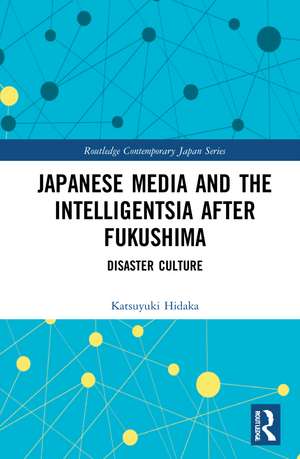Japanese Media and the Intelligentsia after Fukushima: Disaster Culture: Routledge Contemporary Japan Series
Autor Katsuyuki Hidakaen Limba Engleză Hardback – 18 feb 2022
In Japan, nuclear power consistently had more than 70% support in opinion polls. However, the Fukushima disaster of 2011 has caused a shift in public opinion, and the majority of the population now desires an end to nuclear power in Japan. Alternative energy and countermeasures against climate change have thus become hot-button issues in public discourse. Moreover, topics previously left undiscussed have become common talking points among journalists and intellectuals: Concealed power structural dynamics that work upon Japan’s politics, bureaucracy, industry, academia, and media; Japan’s peculiar, strong support for nuclear power, despite being a nation subjected to the atomic bombing of Hiroshima and Nagasaki, and its latent ability to develop nuclear weapons by utilizing the plutonium generated by its power plants; and Japan’s dependence on the US’ nuclear umbrella. These discussions have often evolved into macro-level controversies over ‘Japan’ and its ‘modernity’. In this book, Hidaka critically evaluates how the Fukushima disaster has shaken hegemonic public discourse and compares it to the impact of previous moments of ‘disaster culture’ in modern Japanese history, such as The Great Kanto Earthquake and the Pacific War.
Offers vital insights into contemporary Japanese culture and social discourse for students and scholars alike.
| Toate formatele și edițiile | Preț | Express |
|---|---|---|
| Paperback (1) | 384.86 lei 6-8 săpt. | |
| Taylor & Francis – 25 sep 2023 | 384.86 lei 6-8 săpt. | |
| Hardback (1) | 1007.48 lei 6-8 săpt. | |
| Taylor & Francis – 18 feb 2022 | 1007.48 lei 6-8 săpt. |
Din seria Routledge Contemporary Japan Series
-
 Preț: 311.18 lei
Preț: 311.18 lei - 8%
 Preț: 383.06 lei
Preț: 383.06 lei -
 Preț: 325.09 lei
Preț: 325.09 lei - 9%
 Preț: 934.94 lei
Preț: 934.94 lei -
 Preț: 342.06 lei
Preț: 342.06 lei -
 Preț: 340.60 lei
Preț: 340.60 lei -
 Preț: 327.41 lei
Preț: 327.41 lei -
 Preț: 309.55 lei
Preț: 309.55 lei -
 Preț: 309.93 lei
Preț: 309.93 lei -
 Preț: 202.94 lei
Preț: 202.94 lei -
 Preț: 310.99 lei
Preț: 310.99 lei -
 Preț: 663.94 lei
Preț: 663.94 lei - 14%
 Preț: 1002.06 lei
Preț: 1002.06 lei - 18%
 Preț: 1056.00 lei
Preț: 1056.00 lei - 18%
 Preț: 1061.93 lei
Preț: 1061.93 lei -
 Preț: 338.25 lei
Preț: 338.25 lei -
 Preț: 483.08 lei
Preț: 483.08 lei -
 Preț: 484.04 lei
Preț: 484.04 lei - 26%
 Preț: 820.32 lei
Preț: 820.32 lei - 22%
 Preț: 327.08 lei
Preț: 327.08 lei - 18%
 Preț: 1164.24 lei
Preț: 1164.24 lei - 18%
 Preț: 951.96 lei
Preț: 951.96 lei -
 Preț: 290.77 lei
Preț: 290.77 lei - 25%
 Preț: 823.99 lei
Preț: 823.99 lei - 18%
 Preț: 703.79 lei
Preț: 703.79 lei - 18%
 Preț: 1051.60 lei
Preț: 1051.60 lei - 18%
 Preț: 1059.84 lei
Preț: 1059.84 lei -
 Preț: 390.96 lei
Preț: 390.96 lei - 18%
 Preț: 1113.95 lei
Preț: 1113.95 lei - 18%
 Preț: 1220.42 lei
Preț: 1220.42 lei -
 Preț: 280.57 lei
Preț: 280.57 lei - 26%
 Preț: 791.43 lei
Preț: 791.43 lei -
 Preț: 447.51 lei
Preț: 447.51 lei -
 Preț: 487.44 lei
Preț: 487.44 lei -
 Preț: 334.41 lei
Preț: 334.41 lei - 18%
 Preț: 1113.95 lei
Preț: 1113.95 lei - 18%
 Preț: 1058.79 lei
Preț: 1058.79 lei - 16%
 Preț: 129.96 lei
Preț: 129.96 lei - 18%
 Preț: 1007.48 lei
Preț: 1007.48 lei - 26%
 Preț: 818.59 lei
Preț: 818.59 lei - 18%
 Preț: 1059.84 lei
Preț: 1059.84 lei -
 Preț: 386.30 lei
Preț: 386.30 lei - 18%
 Preț: 1056.95 lei
Preț: 1056.95 lei
Preț: 1007.48 lei
Preț vechi: 1228.63 lei
-18% Nou
Puncte Express: 1511
Preț estimativ în valută:
192.81€ • 199.76$ • 160.91£
192.81€ • 199.76$ • 160.91£
Carte tipărită la comandă
Livrare economică 21 martie-04 aprilie
Preluare comenzi: 021 569.72.76
Specificații
ISBN-13: 9781032101675
ISBN-10: 1032101679
Pagini: 236
Ilustrații: 2 Line drawings, black and white; 2 Illustrations, black and white
Dimensiuni: 156 x 234 x 14 mm
Greutate: 0.51 kg
Ediția:1
Editura: Taylor & Francis
Colecția Routledge
Seria Routledge Contemporary Japan Series
Locul publicării:Oxford, United Kingdom
ISBN-10: 1032101679
Pagini: 236
Ilustrații: 2 Line drawings, black and white; 2 Illustrations, black and white
Dimensiuni: 156 x 234 x 14 mm
Greutate: 0.51 kg
Ediția:1
Editura: Taylor & Francis
Colecția Routledge
Seria Routledge Contemporary Japan Series
Locul publicării:Oxford, United Kingdom
Public țintă
Postgraduate and Undergraduate AdvancedCuprins
Introduction: The Fukushima Nuclear Disaster Ten Years On 1. A Topology of the Mainstream Media: Newspapers and Television 2. Scepticism and Resistance: Scientists and Independent Journalists 3. The Struggle for ‘Japan’: The Intellectuals of the Humanities and Social Sciences 4. Documentary Films and Nuclear Power: Grassroots Movements, Democracy, and Opposition to the Mainstream Media Conclusions
Recenzii
"Hidaka effectively historically contextualizes the Fukushima disaster and is the first to bring in perspectives from a variety of leaders who participate in shaping public opinion including scientists, mainstream media, politicians, and individual-level media such as documentarians."
Notă biografică
Katsuyuki Hidaka is Professor of Media and Cultural Studies at Ritsumeikan University in Kyoto, Japan. He is also a professorial research associate at the School of Oriental and African Studies, University of London, from which he received his Ph.D. degree. His publications include Japanese Media at the Beginning of the twenty-first century: Consuming the Past (Routledge 2017), a winner of the Japan Communication Association Best Book Award.
Descriere
Hidaka analyses the ways in which the Fukushima disaster has changed and divided opinions of nuclear power, and of national identity, in Japan. In Japan, nuclear power consistently had more than 70% support in opinion polls. The Fukushima disaster changed everything.
